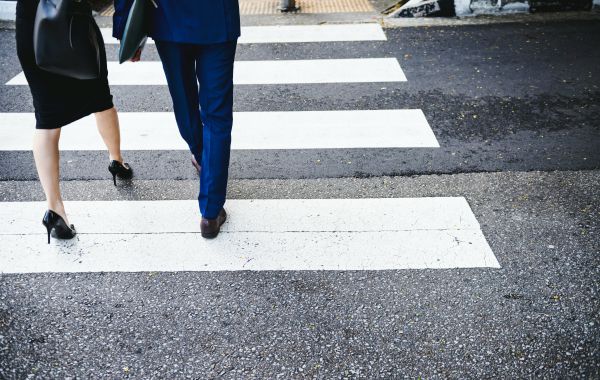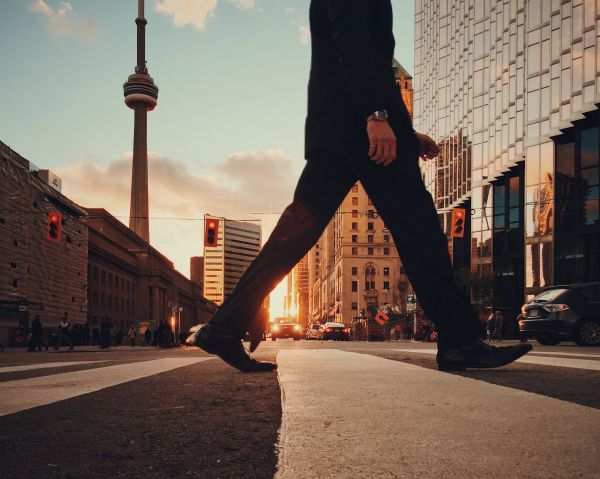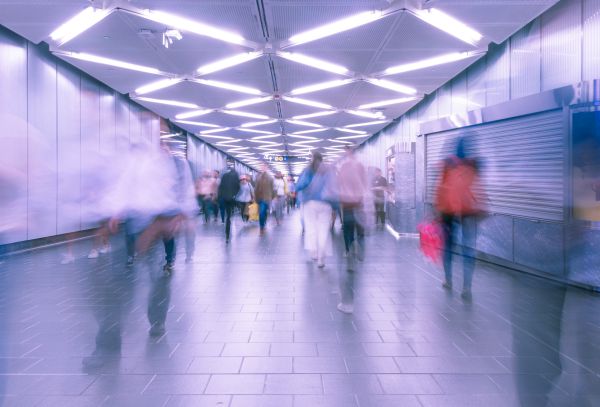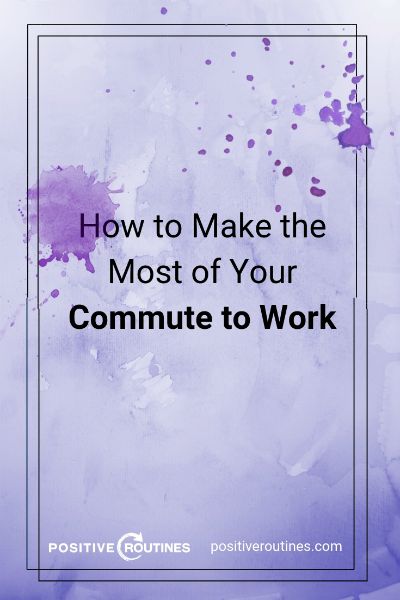If you regularly commute to work, you’ll probably agree that it can be kind of a drag. Especially if you get stuck in traffic or hit with unexpected delays. On average, Americans spend about 26 minutes each way on their commute to work, according to the US Census. That means we spend over 100 hours per year traveling to and from our jobs. And that’s just an average, meaning some of us will spend less time and some even more.
So here’s the thing: Given that commuting is destined to be a part of your day, isn’t it worthwhile to make the most of it?
Why to Take Advantage of Your Commute

What happens if you don’t use your commute to work wisely? You might think the worst outcome is missing the chance to get stuff done. But there’s more to the story: It turns out doing nothing on a long commute can actually be detrimental to your brain.
A large scale study from the UK tracked over half a million people over the course of five years. The 93,000 people who drove more than two hours a day were lower on brainpower when the study began. And this only declined as time wore on. In other words, the frequent drivers’ memory and intelligence declined at a faster rate than those who didn’t spend hours in the car.
The effect is similar for people who spend a long time in front of the TV every day. (We mean at least three hours.) Your brain deteriorates if it’s inactive for too long.
Think the only problem of your daily commute to work is your brainpower (as if that wasn’t reason enough)? Think again. A 2014 British study summed the effects of commuting as:
Holding all else equal, commuters have lower life satisfaction, a lower sense that their daily activities are worthwhile, lower levels of happiness, and higher anxiety on average than noncommuters.”
Ouch.
Worried? Don’t be. We’re all about the good news around here, so we wouldn’t be telling you this if we didn’t have a way to help. The trick is to use your commute to keep your mind active and/or add value to your day. Below we’ll look at how you can do that, taking into account that different activities work better for modes of transportation.
2 Secrets to Making the Most of Any Commute
But first, here are two super-useful, overarching tips to bear in mind for any type of commute.
1. Being productive is great — but so is enjoyment

In other words, full props to you for listening to a productivity podcast on your way to work. But at the same time, don’t feel guilty if you decide to use your commute to listen to a show that makes you laugh. Whatever sets you up to feel good for the day is going to give you benefits.
2. If possible, take it slow

Bursting out the door like a whirlwind of stress so you can spend the next 30 minutes biting your nails and praying for the traffic to move faster? Not the best way to start the day. Instead, deliberately slow down so you can enjoy the ride. (Yes, you’ll probably have to get up a bit earlier. Trust us: It’ll be worth it.)
Author and productivity coach, Hillary Rettig, sums this up best in an article for Fast Company:
When people are commuting, they’re most likely rushing. Rushing degrades our happiness. Most of us probably don’t realize the stress it causes us physically and emotionally… When you give yourself extra time, your blood pressure stays low and your commute is a less destructive part of the day.”
Now, with those two things in mind, here are a whole bunch of great ways to make the most of your daily commute to work.
If You Commute to Work by Public Transport

A regular on the bus, subway, or train? Awesome for you, because you have so many options of things you can do. As long as you’re not driving the bus, you can give maximum attention to your commute activity. Here are six ideas for setting your day up right before you even get to the office.
1. Meditate

We regularly delve into the science-backed benefits of meditation, so we won’t go through it all in detail here. Suffice to say that meditating is proven to lower stress and calm your mind. Aka, just what you need to get you through the workday.
Now, finding your Zen amidst the chaos of a crowded train isn’t always easy, we get it. To make it easier—especially if you’re just getting started with meditation—try a meditation app or meditation podcast. They’ll immerse you in the activity by giving you something to focus on, guiding you through, and blocking out some of the noise around you.
And just an FYI, you don’t have to close your eyes. But even if you do, your fellow travelers will just think you’re dozing. Now you really have no excuses to make meditation a daily habit in your life.
2. Write about and appreciate the good

In other words, build a gratitude habit. Practicing gratitude is another proven way to become calmer and happier. One easy way to do it? Keep a gratitude journal.
Research shows that the simple act of regularly writing down five things you’re grateful for can improve your mood and make you more optimistic. It doesn’t matter how small or frivolous the things on your list are. Just be sure to make them specific, and use your commute to think about, savor, and appreciate them. And yes, being grateful that it’s Friday definitely counts.
3. Read

Whether it’s a dog-eared paperback or an eBook, your morning commute to work is the perfect opportunity to get lost in a book. Catch up on some interesting and informative non-fiction…or don’t. Reading fiction has proven benefits too, like reducing anxiety and improving your ability to understand other people by putting yourself in their shoes. So if you want to run out and pick up the Fifty Shades trilogy… well, to each their own.
4. Set daily goals

A field study by Harvard Business School found that commuters who think about and plan for their upcoming workday “are less likely to be negatively affected by lengthy commutes to work.” In short — spend a few minutes planning or setting goals for the day ahead, and you’ll arrive at work feeling better prepared and more energized to face the day.
+ Want one place to jot down both your daily goals and things you’re grateful for? Try Panda Planner to make these happiness and productivity habits automatic.
5. Take a nap

Naps are great. Let’s say you’re a little sleep deprived thanks to work stress, a newborn baby, an addiction to the latest Netflix series, or whatever. Grabbing a little shut-eye on your commute can, among other things, balance out the negative effects of sleep debt (i.e., getting too little sleep too often) by reducing stress and boosting immunity.
Just make sure you’re in a safe environment—and that you don’t miss your stop.
6. Talk to someone

We know. But there’s research that suggests that the longer you spend commuting, the less social connections you have. And we all know that social connections are big-time happiness boosters. As in making your life longer.
There’s also research that suggests that merely connecting with a stranger in some small way, like commuting, ups feelings of happiness. And this isn’t speculation—the commuters were actually part of the study.
Not sure how to make this work? Still rolling your eyes? Start small. Think about something everyone on the train might be feeling, like how slow the ride is or how packed the car is. Commiserate together. Make a joke. Laugh. You’ll be surprised by how much you can lift your own mood—and quite possibly, those around you too.
If You Walk or Ride a Bike

If your commute involves physical activity, you’re already at an advantage. As we know, exercise has a laundry list of benefits to both health and mental well-being. Still, you can maximize those benefits by adding in one of the following activities.
1. Practice mindfulness

The feeling of the wind on your face. The rhythm of your own breath. The way the environment around you changes with each season or at different times of day. Paying attention to these types of things is a simple way to practice mindfulness. And as we’ve explored before, mindfulness has surprising benefits in areas like stress, depression, and creativity. Simply choosing to be more present during your commute can have a positive impact on your day.
Try it:
- Turn your phone on airplane mode.
- Put your headphones away.
- Engage as many senses as possible—touch, sound, sight, smell, etc. (Taste is harder, but you can certainly try.)
- Not working for you? Try describing what you see around you in great detail in your mind, including the sounds, smells, and so on. Congratulations—you’re being mindful.
- Dedicate five minutes of your commute to this.
- Up it next week.
2. Listen to podcasts or audiobooks

If you’re walking or biking in traffic or urban areas, you’ll need to be alert and use your senses to get around safely. So we don’t recommend pumping loud music in both ears. Instead, if it’s safe to do so, try listening to a podcast or audiobook using earphones that don’t block out all ambient noise. Or only using one earbud. (You don’t need stereo sound for spoken voice like you would for music.)
That way, you can take in a good discussion or story while still being aware of what’s going on around you.
3. Reflect

Socrates said it best, or at least the most iconically: “The unexamined life is not worth living.” When you’re walking or cycling along, it’s a good time to turn your attention inward and reflect. Reflection helps us to make sense of things that have happened, crystallize things we’ve learned, reach important insights, and become more self-aware. So do Socrates proud and give it a shot.
If you commute by car

Commuting by car has one obvious downside: You have to concentrate on the road. Like, all the time. On the positive side, being in your own car affords you a bit of privacy you don’t get on public transport. That in mind, here are some things you can do during your commute to work.
1. Listen to music

Multiple studies point to the healing effects of music, with benefits like reduced stress, improved immunity, relief from anxiety, and better brain function.
We think it’s important to add that you get greater benefits if you sing along loudly and unselfconsciously while air-drumming the steering wheel. (Okay, we don’t have any research to back that one up, but we’re pretty sure it’s a given.) The best place to do that? Sitting in traffic on your way commute to work, obviously.
2. Learn a language

The car is a great place to pick up where you left off on that high school Spanish. Though you’re obviously not going to practice your reading and writing while driving, pump up some audio language lessons and practice both listening and speaking out loud during your commute to work.
Why does this matter, other than giving you the ability to flee the country if necessary? Speaking a second language has been shown to improve multitasking ability, improve rational decision-making, even keep you sharp as you age. And let’s not even start on how good an excuse it is to take an epic trip abroad.
3. Brainstorm

Like we said above, thinking about your plans and goals for the day is a great way to use your commute to work. As an extension of that, you can use your time in the car to brainstorm ideas for any number of things—like personal projects, work projects, the plot line of that blockbuster movie script you’ve been meaning to write, etc.
Use a voice recorder app to think aloud and record ideas so you don’t forget them.
4. Be social

We hardly need to supply evidence for you to agree that socializing just makes you feel good. Connecting with other human beings is a part of, well, what makes us human. So using your commute to work for a bit of social interaction can be extremely beneficial to your mood and mental health.
How to pull it off? For one thing, you could switch your solo commute to a system of carpooling. Not only do you get to share the joys of rush-hour traffic with others, but you’ll also be doing the environment a favor.
Another option is to use a handsfree device to make in-car phone calls and catch up with friends and family. Just make sure you’re still paying attention to the road.
To sum it all up…

There’s no one right way to make the most of your commute to work. You might listen to an audiobook one day, brainstorm for a meeting the next, and have a good chat with a fellow commuter the day after that. Regardless of your choice, the key is to do something that works with your commute time and your mode of transportation and that’s most likely to boost your mood and your brainpower.
While we can’t make the commute itself go away, we can assure you that using your commute wisely will get you into work feeling far more energized and ready to start the day. And that makes your whole workweek a little easier to manage, which is what we’re all about. Happy travels.
Your turn: How do you commute to work, and what activities have you tried in order to make the most of your journey? Let us know in the comments.
Feeling good on the way to work? Here’s how to make it last all day.

Author: Tania Braukamper
Tania Braukamper is an Australian-born writer and photographer. She believes in curiosity, kindness, and adventure as a state of mind.

Let Us Know What You Think